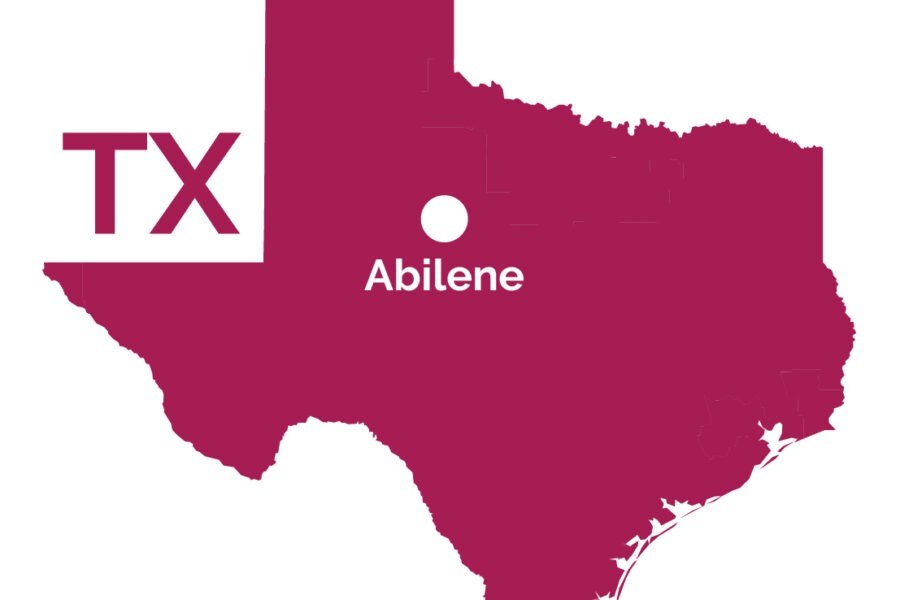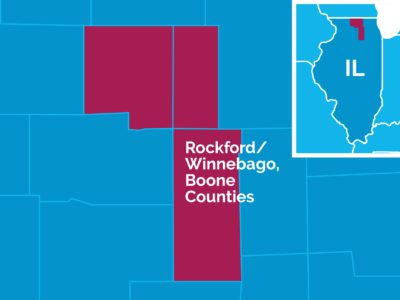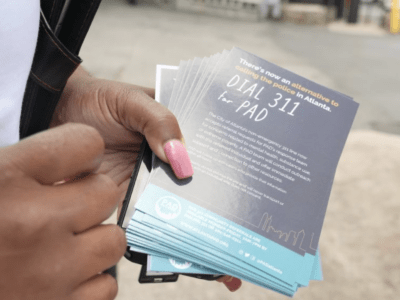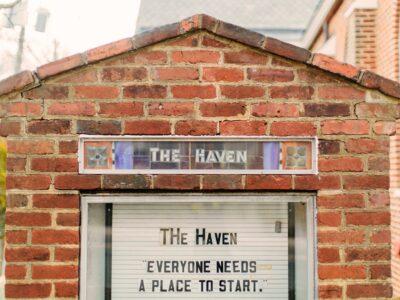COVERAGE AREA
Cities: 1
Counties: 1
Total Population: 122,999
The Achievement
FUNCTIONAL ZERO FOR VETERAN AND CHRONIC HOMELESSNESS
- Milestones Reached: Veteran (January 2019) and Chronic (November 2019)
- Next Population for Focus: Youth and/or family homelessness
Abilene, Texas, part of the Texas Balance of State Continuum of Care, achieved functional zero for chronic homelessness in November 2019, after reaching functional zero for veteran homelessness in February 2019. It is a part of Built for Zero, a movement of more than 80 communities committed to measurably ending homelessness, one population at a time. The Continuum of Care for Texas Balance of State – Abilene joined Built for Zero in 2018.
Abilene became the fourth community in the United States to end chronic homelessness and reach zero people experiencing chronic homelessness. Chronic homelessness describes people who have experienced homelessness for at least a year— or repeatedly— while struggling with a disabling condition such as a serious mental illness, substance use disorder, or physical disability.
A community has ended chronic homelessness when three or fewer people are experiencing chronic homelessness (or 0.1% of the community’s most recent total homelessness individual point-in-time count, whichever is greater). This definition is shared between Built for Zero and the federal government. From November 2019 to January 2020, Abilene reduced that number to three individuals and then to zero, achieving a successful three-month sustaining period of functional zero.
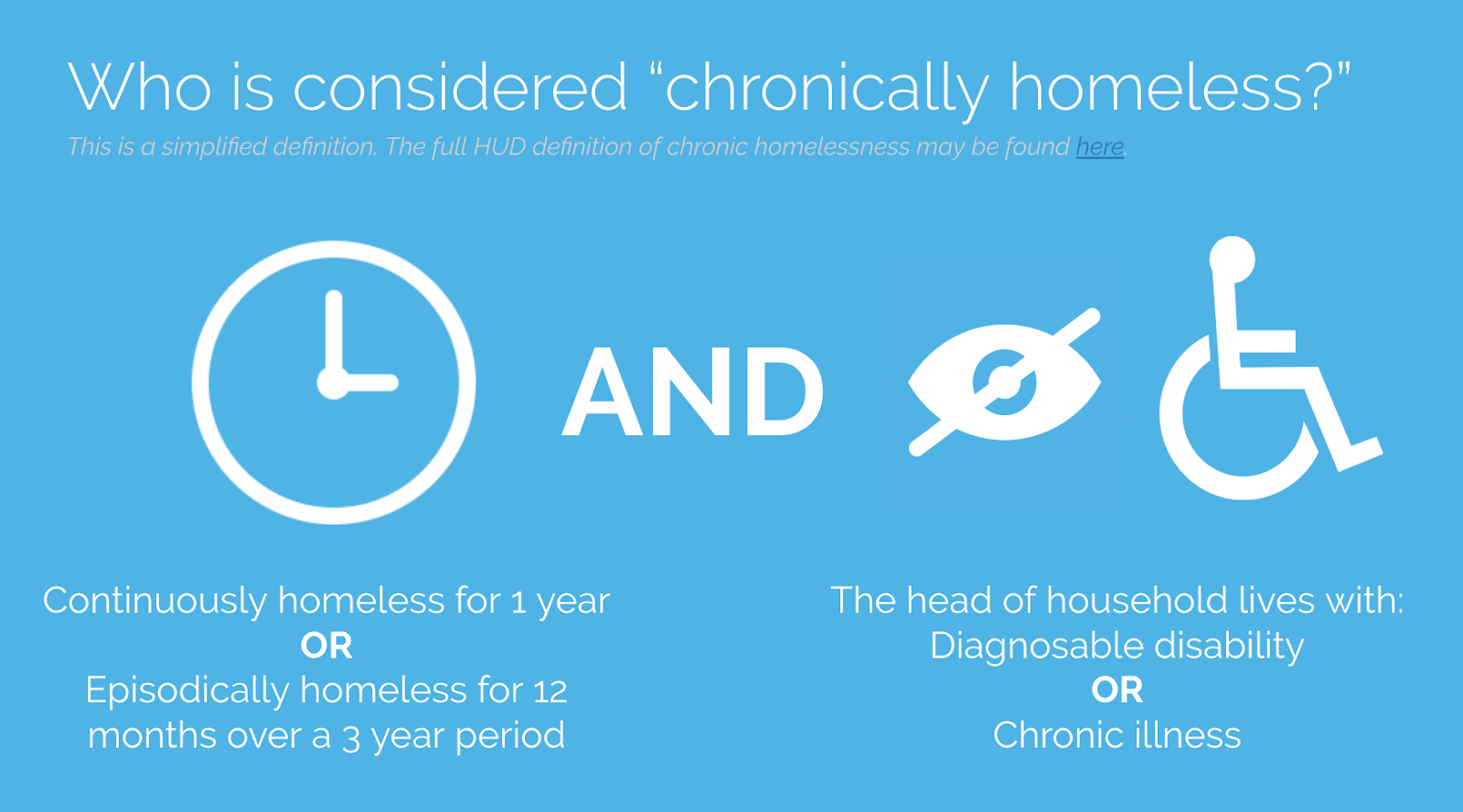
In February 2019, Abilene reached functional zero for veteran homelessness, demonstrating that there are fewer veterans experiencing homelessness than can be routinely housed within a month, which is seven veterans in Abilene. By reaching functional zero for veteran homelessness, the community has proven it has built a system that can ensure homelessness is rare and brief, even if new veterans experience housing crises over time.
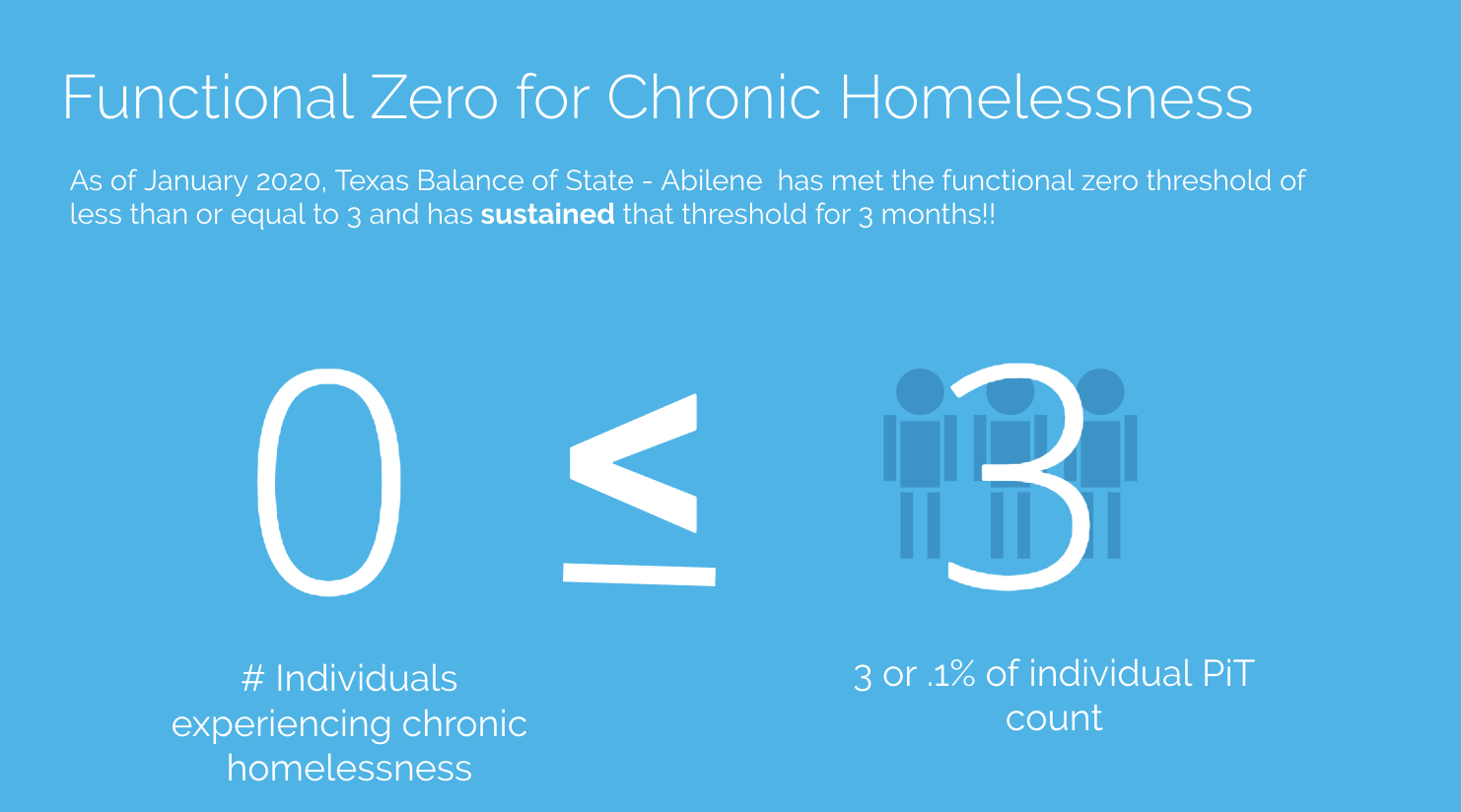
How did they do it?
As part of Built for Zero, Abilene changed how its homeless response system works by adopting the core elements of the Built for Zero methodology:
- Building a unified regional team, or a “command center,” around a shared aim of getting to functional zero
- Using real-time, person-specific data to know every person experiencing chronic homelessness or veteran experiencing homelessness by name and target efforts and resources accordingly
- Using data to redesign Abilene’s homeless response system and strategically target resources
BUILDING A COMMAND CENTER
The local Built for Zero team started by unifying the efforts of key agencies working locally to end homelessness. In many communities, local agencies or nonprofits focus on their piece of the solution, without an ability to see how all the pieces in their community fit together. Often, success is defined by each organization’s programmatic goals rather than whether the overall number of people experiencing homelessness is going down.
Abilene worked to reorganize their efforts around a shared goal of reaching functional zero on chronic homelessness. For example, the Abilene team met with a specific homeless provider to truly allow that organization to see where they fit in the process and how they played a significant role in reaching the goal of ending chronic homelessness.
Ensuring all internal players were on a level field was important in enacting this command center approach. During training sessions and coordinated entry meetings with staff, the two Built for Zero Leads — Katherine Bisson, Executive Director at Abilene Hope Haven and Alexzandra Hust, Director of Programs at Abilene Hope Haven — would stress the importance of focusing on their most at-risk neighbors first, while also taking the time to educate everyone in the room about what that actually means. This led to significant improvements in the verification process — helping providers and the community understand the true meaning and definition of chronic homelessness, so they could then support the Built for Zero team in their work to end chronic homelessness in Abilene.
GETTING TO QUALITY REAL-TIME DATA
You cannot solve a problem that you don’t understand. In order to measurably end homelessness, communities need real-time, person-specific data. Traditionally, an understanding of the issue of homelessness in a community has been limited to an annual estimate of people experiencing homelessness, called the point-in-time count. This is an aggregate number that provides an estimate of people experiencing homelessness on a single night, but does not include the names or needs of the people who make up that number.
Communities in Built for Zero develop by-name lists, which provide real-time insights into everyone experiencing homelessness by name. This enables communities to triage that individual’s needs, understand if their investments and activities are driving homelessness down, and test and innovate ideas that will move people out of homelessness faster.

By August of 2018, the team had created a system that ensured quality data on every person experiencing chronic homelessness and every veteran experiencing homelessness. This data enabled them to understand who was moving out of homelessness, who was entering into it, and who was remaining on the list.
“My hesitation in pursuing functional zero for chronic homelessness was being confident that our by-name list was accurate,” said Bisson. “Agencies in our communities have done homeless outreach for many years to provide food and other basic needs to promote survival. However, none of the outreach was coordinated or housing-focused. It was unsettling to wonder if we were missing some of the most at-risk in our community.”
As former Housing Navigator Rosten Callarman explained, “We didn’t want to say that we had achieved functional zero unless we had done the outreach to find out who actually was in the streets.”
In June of 2019, the team began implementing heavy outreach efforts to connect with their clients or neighbors, as they are called in Abilene. Additional passthrough funding provided by the Ballmer Group allowed them to hire someone to focus solely on outreach.
“We changed this component of our system, which was not quick or easy,” Bisson said. “But it feels so good to reach functional zero knowing that all of those involved went above and beyond to reach this goal with integrity.”
INCREASING TRUST WITH THEIR NEIGHBORS
“I think that just knowing exactly where our neighbors were staying and truly being able to interact with them made a difference,” Hust said.
Even Bisson, their organization’s Executive Director, went out in the community and in the woods to find where many of their neighbors were living.
“I think that that also provided an opportunity for us to build relationships [with neighbors],” explained Hust. “Relationships alone have quickened the process, because as you can imagine when you’re living outdoors for so long, having any type of trust is still difficult. Trust is a huge, huge factor for our neighbors,” said Hust.
One of the many ways the Abilene team worked to establish and strengthen their relationships with their neighbors was practicing what they call “radical hospitality.”
“Our efforts are to basically treat someone walking into our office as if the mayor were walking into our office,” Hust said. “We offer the same, exact accommodations as we would to the mayor: ‘Do you want some coffee or some water? Are you comfortable where you’re at, or is there anything I can do to make your more comfortable while you’re here?’” All this serves to ensure each neighbor they work with has a very dignified experience, while also helping to lower potential barriers to housing.
The Abilene team recognizes that neighbors are often experiencing both significant trauma and a loss of pride when they come to them for help. As a neighbor seeking assistance at Abilene Hope Haven, “You’re having to be at-risk and to share your life situation to a stranger,” Hust said.
The team also improved their case management practice, establishing housing-focus meetings with the neighbors that included regular check-ins on aspects they might be struggling with. “for a lot of our neighbors it’s been years since they’ve ever paid bills,” Hust said. Through progressive engagement practices, the Abilene team would offer support on this steep learning curve by reminding neighbors to check their mail regularly or teaching them how to pay a bill online.
Through these intentional case management practices, the Abilene team wants to remind their neighbors that “we’re a kind of bridge that can never be burned,” Hust said.
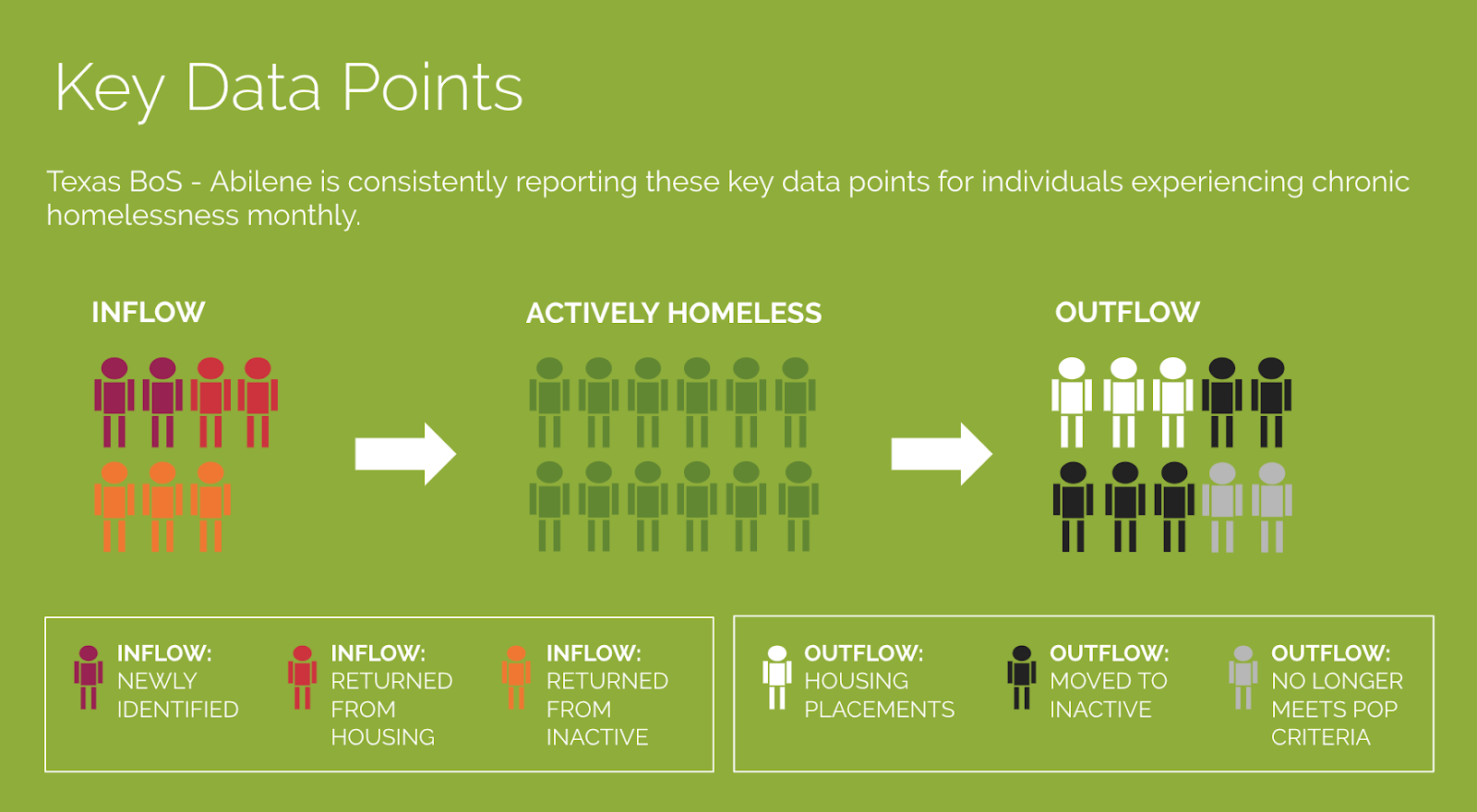
USING DATA AND AN IMPROVEMENT MINDSET TO REDESIGN ABILENE’S HOMELESS RESPONSE
Once the team began establishing their quality by-name list data, they worked on reducing the numbers of neighbors on that list.
“It is amazing what Abilene has been able to accomplish in such a short period with true commitment and the ability to adapt,” Bisson said.
Beginning in January 2018, the Abilene team began using their chronic by-name list data to test and improve their homeless response system. They focused especially on improving their rapid resolution practice, which is housing intervention designed to prevent immediate entry into homelessness or to immediately resolve a household’s homelessness once they enter shelter, transitional housing, or an unsheltered situation. Improving this system-wide intervention strengthened their ability to see people’s needs more quickly.
Through monitoring and case conferencing their at-risk list, along with practicing diversion and rapid resolutions for those on the list, the team was able to prevent new inflow.
Additionally, the team was able to concentrate their efforts fully on housing those who had experienced chronic homelessness in their community, with other staff members focusing on other neighbors. In this way, the Abilene Built for Zero team was able to more immediately support those who were most at-risk in their community.
The Abilene team’s Built for Zero Improvement Advisor, Habiba Rotter, stressed the importance of actionable goal setting, especially in terms of their by-name list data. For example, if they were trying to get a 50% reduction in a certain number of months, that means they will need to house a specific number of people a month. Achieving these specific goals required a variety of improvement projects and systems testing.
The team began implementing the verification process earlier, which reduced the time from identification of someone as next on their list for housing to enrolling them in their program. Seeing this system improvement in action garnered more community support, with more providers wanting to participate in the process as verification sites.
By June 2020, the average length of time from identification of a person experiencing chronic homelessness to housing placement was reduced to 48 days.
“They really were a team that was open to working around or within or over anything,” Rotter said. “They really didn’t let bureaucracy get in the way of a lot of things that they had to do in order to get better at what they did.”
“We could not have done this without our Improvement Advisor, Habiba Rotter, and the Built for Zero team,” Bisson said. “They helped to keep us focused and always consider the bigger picture when we tend to get bogged down in our day-to-day work. In addition, the moral support that was provided gave us strength to push forward and overcome both external and internal barriers.”
What’s Next
SUSTAINING AND EXPANDING

“I think really the lesson from Abilene is that there’s no magic formula. It really is about just learning how to work smarter and faster,” Rotter explained.
Now that they have achieved and sustained functional zero for veterans and chronic homelessness, the Abilene team is working to reach functional zero for family and/or youth homelessness, utilizing their skills to end homelessness for these new populations. John Meier with the veteran Built for Zero Improvement Team is working with a youth homelessness provider, and a steering committee has been established to take the next steps.
Timeline
2018
- February: Abilene joins Built for Zero Collaborative.
- April: Reached quality data on veteran homelessness.
- August: Reached quality data on chronic homelessness.
- November: Abilene achieved functional zero for veteran homelessness
2019
- February: USICH confirms Abilene has effectively ended veteran homelessness
- March: Abilene team formally commits to ending chronic homelessness and sets a target end date
- November: Abilene reaches the chronic homelessness functional zero threshold. Three-month sustaining window begins.
2020
- January: Abilene successfully holds functional zero for three months and is confirmed as reaching functional zero for chronic homelessness.
Who was on the team?
Chronic Community and Data Leads:
Katherine Bisson
Executive Director, Abilene Hope Haven, Inc.
Built for Zero Community and Data Lead
Alexzandra Hust
Director of Programs, Abilene Hope Haven, Inc.
Built for Zero Community Lead
Faith Ochoa
Executive Assistant, Abilene Hope Haven, Inc.
Built for Zero Data Lead
John Meier
Program Manager
West Central Texas Regional Foundation
Built for Zero Data Lead
THE CHRONIC TEAM
HMIS Leads: Katherine Bisson and Faith Ochoa
Housing Navigator: Perry Covington, Abilene Hope Haven, Inc.
CoC Lead: Texas Homeless Network
Frontline Staff Champions: Rosten Callarman, Karen Covington, Courtney Horton, Kacie Flores, Sal Almohammed, and Mike Prado, and Alexzandra Hust
MVP: Mary Cooksey, Program Director for 2-1-1, United Way of Abilene
Jurisdictional Executive: Mayor Anthony Williams
PHA Lead: Abilene Housing Authority
Built for Zero Coach:
Habiba Rotter
Improvement Advisor for Built for Zero
